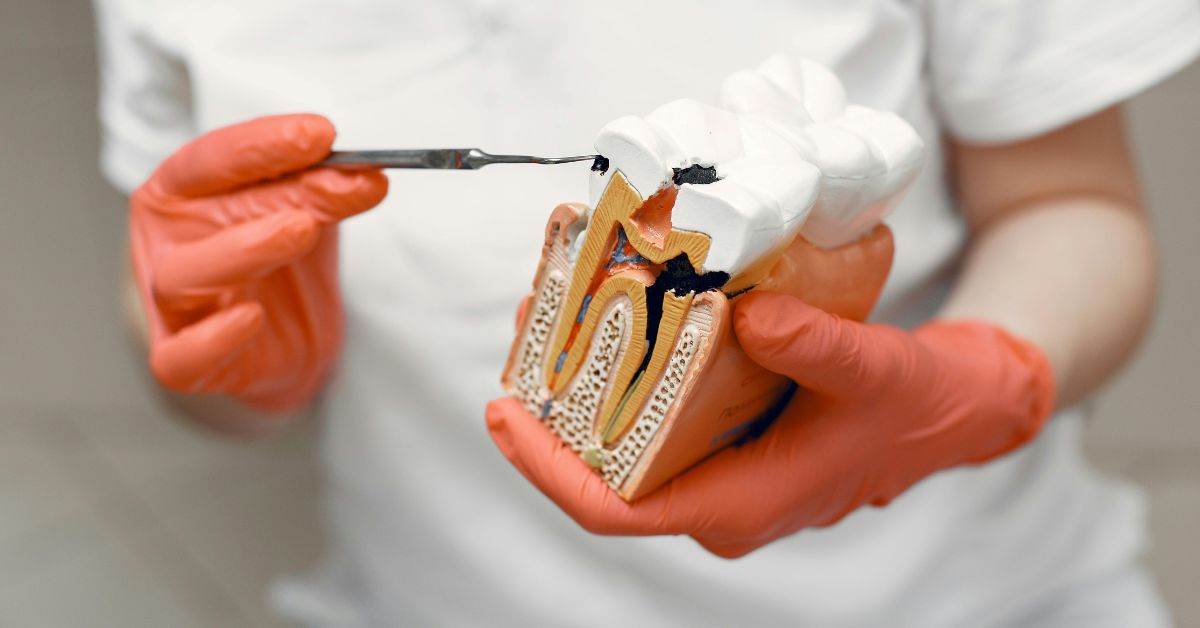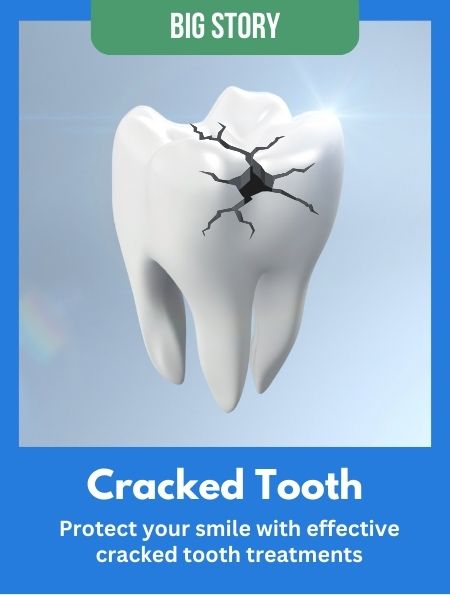Tooth decay is one of the most common dental problems affecting people. Left untreated, it can lead to severe pain, infection, and even tooth loss. Understanding the available tooth decay treatment options, as well as prevention strategies, can help you protect your oral health and maintain a confident smile.
Back to Big Story: Cracked Tooth Treatment
Schedule an appointment with a Dentist
What Is Tooth Decay?
Tooth decay, or dental caries, occurs when plaque, a sticky film of bacteria, builds up on the teeth. The bacteria produce acids that erode the tooth enamel, eventually reaching the inner layers of the tooth.
Common Symptoms of Tooth Decay:
- Tooth sensitivity, especially to hot, cold, or sweet foods and drinks.
- Visible pits, holes, or dark spots on the teeth.
- Persistent toothache or pain when chewing.
- Bad breath or unpleasant taste in the mouth.
Early detection is key. Routine dental check-ups can identify decay before it progresses to severe stages.
Causes of Tooth Decay
Understanding the causes of tooth decay helps prevent it:
- Poor Oral Hygiene – Irregular brushing and flossing allow plaque to accumulate.
- Diet High in Sugars and Acids – Frequent consumption of sugary snacks, sodas, and acidic drinks contributes to enamel erosion.
- Dry Mouth – Saliva helps neutralise acids; reduced saliva flow increases the risk of decay.
- Genetic Factors – Some individuals may naturally have weaker enamel or more cavity-prone teeth.
- Medical Conditions – Conditions such as diabetes or certain medications can increase susceptibility to tooth decay.
Stages of Tooth Decay
Tooth decay progresses in stages, which affects the type of treatment required:
- Initial Demineralisation – Early enamel damage that may be reversible with fluoride treatment.
- Enamel Decay – Visible enamel breakdown; fillings may be required.
- Dentin Decay – Decay reaches the dentin, causing sensitivity and requiring restorative treatment.
- Pulp Involvement – Decay reaches the tooth pulp, leading to infection and potential root canal therapy.
- Abscess Formation – Severe infection may cause swelling and require extraction if the tooth is unsalvageable.
Common Tooth Decay Treatment Options
The appropriate tooth decay treatment depends on severity and tooth condition.
1. Fluoride Treatments
Fluoride strengthens enamel and can reverse early-stage decay. This is most effective when the decay is detected before cavities form.
2. Dental Fillings
Dentists remove decayed tissue and restore the tooth using materials such as:
- Composite resin (tooth-coloured and aesthetically pleasing).
- Amalgam (durable, silver-coloured).
- Porcelain (used for larger restorations or cosmetic purposes).
3. Dental Crowns
For extensive decay or weakened teeth, a crown covers the remaining tooth structure, restoring function and appearance.
4. Root Canal Therapy
Required when decay reaches the pulp. The infected tissue is removed, the canals are cleaned, and the tooth is sealed to prevent reinfection.
5. Tooth Extraction
For severely decayed teeth that cannot be saved. Dentists often recommend replacement options such as:
- Dental implants – Permanent artificial tooth replacement.
- Dental bridges – Fixed solutions connecting adjacent teeth.
- Partial dentures – Removable options to restore function and aesthetics.
6. Advanced Treatments
- Laser Dentistry – Minimally invasive technique to remove decay with precision.
- Sedation Dentistry – Helps anxious patients undergo treatment comfortably.
Tooth Decay Treatment Cost
To know more about the typical cost, visit our article: Tooth Decay Treatment Cost Singapore: Cracked Tooth & Repair Pricing
Complications of Untreated Tooth Decay
Untreated tooth decay can lead to:
- Severe toothache and difficulty eating.
- Tooth abscess and infection, which may spread to other parts of the body.
- Tooth loss, affecting speech, chewing, and confidence.
- Increased risk of gum disease and systemic health issues.
Preventing Tooth Decay
Prevention is always better than treatment. Effective strategies include:
- Brushing teeth twice daily with fluoride toothpaste.
- Flossing daily to remove plaque between teeth.
- Reducing sugary and acidic food and drink consumption.
- Drinking plenty of water to aid saliva production.
- Regular dental check-ups every six months.
- Using dental sealants for children or high-risk teeth to protect enamel.
Dentists You May Consider Consider
We have partnerships with trusted and licensed dentists in Singapore and beyond. Our network ensures that you receive professional care, transparent pricing, and reliable treatment options tailored to your needs.

For inquiries or for an introduction to a trusted dentist, contact us below.
Frequently Asked Questions (FAQs)
1. How do I know if I have tooth decay?
Signs include tooth sensitivity, visible pits or holes, pain when chewing, and discolouration. Early detection through routine check-ups is recommended.
2. Is tooth decay treatment painful?
Modern dental techniques, including local anaesthesia and sedation, ensure that most treatments are comfortable and pain-free.
3. Can tooth decay be reversed naturally?
Early-stage decay may be managed with fluoride treatments and improved oral hygiene. Advanced decay requires professional intervention.
4. How much does tooth decay treatment cost in Singapore and Malaysia?
Costs vary depending on the procedure and severity. Fillings are more affordable, while crowns and root canals cost more. Contact us for a detailed cost estimate.
5. How often should I visit the dentist for prevention?
Visiting a dentist every six months is recommended for routine check-ups, cleaning, and early detection of decay or other dental issues.
Disclaimer: 365Asia aims to provide accurate and up-to-date information, our contents do not constitute medical or any professional advice. If medical advice is required, please consult a licensed healthcare professional. Patient stories are for general reading. They are based on third-party information and have not been independently verified.





